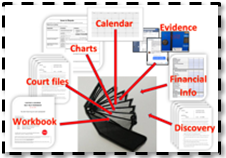People going through a divorce without the benefit of an attorney now have access to a great tool that will help them navigate the process: “The Maryland custody and divorce client notebook.” The notebook can be found at the Maryland People’s Law Library: https://www.peoples-law.org/workbook It was created by Dave Pantzer, People’s Law Web Content Coordinator, Maryland State Law Library, and Joanna Shapiro who staffs the Frederick County Courthouse Family Law Clinic.

The notebook will soon be distributed to clients of the Anne Arundel County Family Law Self-help Center thanks to a grant from the Judiciary’s Department of Family Law Administration. This will allow those using the center to easily inform the attorney on duty where they are in their case.
The notebook is described on the webpage:
“The Maryland Custody & Divorce Client Notebook helps clients to navigate a family law case from start to finish, with the help of an attorney (or attorneys) from self-help, legal services, pro bono, or the paid private bar. The notebook itself helps clients keep papers and evidence with them, and in one place. Inside, the “Topic of Dispute” chart is the heart of the tool, helping clients to identify and understand the key issues and evidence that will make or break their case. A calendar and journal help the client record facts and gather evidence even before they find a lawyer. And the other sections help a lawyer (or the client, if no lawyer is involved) to navigate a settlement or a trial. “
In addition to the link to the actual document on the Maryland People’s Law Library page with which to create the notebook, there are links to articles that will answer the many questions that will come up along the way. Examples include articles about custody and visitation:
C5. Decision-making Authority (Legal Custody) @ https://www.peoples-law.org/child-custody-maryland
C6. Parenting Time (Physical Custody) @ https://www.peoples-law.org/child-custody-maryland
C7. Access (Visitation) @ https://www.peoples-law.org/visitationsupervised-visitation)
and marital property:
D10. Who gets the home? @ : https://www.peoples-law.org/property-disposition-divorce
and D11. Who gets the vehicles? @ https://www.peoples-law.org/property-disposition-divorce
And to go with that notebook — there is always the Family Law Self Help Center located here in the Anne Arundel County Public Law Library. The Center is open on Monday, Wednesday and Thursday from 9:00 am until 4:30 pm. The Center closes at 1:00 pm on Tuesday and Friday.
